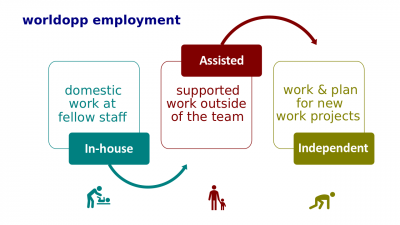Difference between revisions of "Careerprise Employment"
| Line 1: | Line 1: | ||
| − | [[File:Worldopp-employment.png|400px|thumb|right|[[ | + | [[File:Worldopp-employment.png|400px|thumb|right|[[Careerprise Employment]]]][[Careerprise Employment]] (hereinafter, the ''Employment'') is the process in which graduates from [[Educaship Fellowship]] start out as [[apprentice]]s working part-time for [[WorldOpp Fellow Staff]], later become full-time employees, and finally move to independent work for their own companies and/or other employers. |
Education is another vital part of the ''Employment''. At the same time, study schedule starts with 35 hours a week and gradually goes down to 5 hours a week within 8 months. | Education is another vital part of the ''Employment''. At the same time, study schedule starts with 35 hours a week and gradually goes down to 5 hours a week within 8 months. | ||
Revision as of 19:23, 5 March 2023
Careerprise Employment (hereinafter, the Employment) is the process in which graduates from Educaship Fellowship start out as apprentices working part-time for WorldOpp Fellow Staff, later become full-time employees, and finally move to independent work for their own companies and/or other employers.
Education is another vital part of the Employment. At the same time, study schedule starts with 35 hours a week and gradually goes down to 5 hours a week within 8 months.
The Employment is the final stage of WorldOpp Pipeline.
Contents
Components
The Employment is a combination of work experience, career administration, and study. The study includes both on-the-job training and formal education.
Work experience
- Based on results of CNMCyber Bootcamp, WorldOpp fellows are placed into some specialty path such as accounting, business analysis, executive administration including entrepreneurship, information technology, project management, and/or systems engineering in order to build up their work experience.
On-the-job training
- One or more mentors are assigned to every WorldOpp fellow.
Formal education
- Main wikipage: WorldOpp Fellow Curriculum
- No single curriculum exists. Three parties, namely --
- Bracka School as an educational institution;
- Friends Of CNM as an employer; and
- A WorldOpp fellow him- or her-self;
- -- are supposed to team up in order to craft learning plans for every WorldOpp fellow individually. However, these plans shall comply to unified guidelines known as WorldOpp Fellow Curriculum.
Career administration
- Main wikipage: Career administration
Stages
No path is the same. However, by default, the Employment could be divided in three stages.
In-house employment
- WorldOpp fellows are supposed to start out as staffers at WorldOpp Fellow Staff. The work schedule can start with 5 hours of work a week and gradually increase to a full-time work schedule in about 8 months. For instance, the following table can represent the combination of study and work for executive administrators:
Tentative schedule of WorldOpp in-house employment for executive administrators Work week WorldOpp week Activities Student hours Work hours 1 WorldOpp Orientation, Employableu Foundation, CNMCyber Bootcamp Not defined 0 2‑6 Educaship Fellowship 40 1 7 WorldOpp in-house employment: (a) 279 hours of relevant training and (b) 81 hours of work as a business analyst, account manager, and/or partner liaison 35 5 2 8 34 6 3 9 33 7 4 10 32 8 5 11 31 9 6 12 30 10 7 13 29 11 8 14 28 12 9 15 27 13 10 16 WorldOpp in-house employment: (a) 120 hours of relevant training and (b) 80 hours of work as a systems engineer, solution architect, and/or information architect 26 14 11 17 25 15 12 18 24 16 13 19 23 17 14 20 22 18 15 21 WorldOpp in-house employment: (a) 78 hours of relevant training and (b) 82 hours of work as a product designer, product owner, and/or content manager 21 19 16 22 20 20 17 23 19 21 18 24 18 22 19 25 WorldOpp in-house employment: (a) 48 hours of relevant training and (b) 72 hours of work as a UX designer, usability analyst, and/or graphic designer 17 23 20 26 16 24 21 27 15 25 22 28 WorldOpp in-house employment: (a) 39 hours of relevant training and (b) 81 hours of work as a procurement manager, contracts administrator, and/or business buyer 14 26 23 29 13 27 24 30 12 28 25 31 WorldOpp in-house employment: (a) 30 hours of relevant training and (b) 90 hours of work as a project manager, team lead, and/or Scrum Master 11 29 26 32 10 30 27 33 9 31 28 34 WorldOpp in-house employment: (a) 15 hours of relevant training and (b) 65 hours of work as a configuration manager, DevOps engineer 8 32 29 35 7 33 30 36 WorldOpp in-house employment: (a) 11 hours of relevant training and (b) 69 hours of work as an accountant, business administrator, and/or functional manager 6 34 31 37 5 35 32 and further 38 and further Individualized activities within the Employment; most likely, in the assisted employment
Assisted employment
- After obtaining initial work experience at WorldOpp Fellow Staff, WorldOpp fellows are placed in assisted employment with local companies that support WorldOpp. The schedule shall allow keeping a ratio of 35 hours of work and 5 hours of formal education every week.
- The compensation depends on the employer's payroll schedule; however, the fellows often receive some portion of what skilled workers are paid at the beginning and are gradually moved to the full compensation amount in about a year.
- Assistance is the single vital feature of this stage. Friends Of CNM supports the participating fellows administratively, financially, legally, and technologically.
Independent employment
- At the final stage, WorldOpp fellows should be able to navigate the employment market on their own. Special financing is available for those fellows who is willing and capable to start their own enterprises.
- So, the fellows can be employed by their own companies, other employers, or by any combination of those. For any fellow, assistance is still available for their new work projects.

